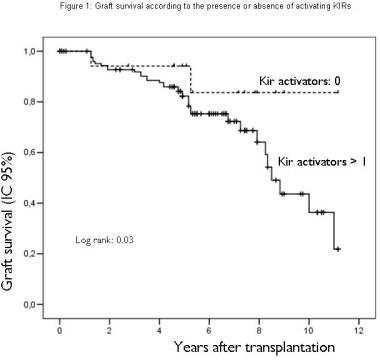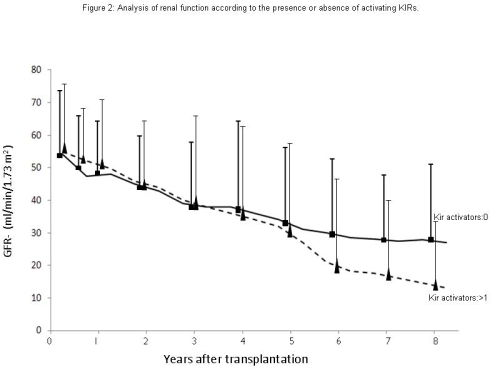Role of Natural Killer Cells in Kidney Transplant Outcome.
1Renal Transplant Unit, Azienda Brotzu, Cagliari, Italy
2Regional Transplant Coordination, ASL 8, Cagliari, Italy.
Meeting: 2016 American Transplant Congress
Abstract number: A274
Keywords: Biopsy, Glomerular filtration rate (GFR), Graft function, HLA antigens
Session Information
Session Name: Poster Session A: Poster Session III: Kidney Complications-Other
Session Type: Poster Session
Date: Saturday, June 11, 2016
Session Time: 5:30pm-7:30pm
 Presentation Time: 5:30pm-7:30pm
Presentation Time: 5:30pm-7:30pm
Location: Halls C&D
Aim of the study was to evaluate the relationship between killer cell immunoglobulin-like receptor (KIR) phenotype and kidney transplant rejection. NK-target cell interaction depends on the balance between activating and inhibitory signals and the role of KIRs. Several HLA class I molecules have been identified as ligands for KIRs receptors. One of the main mechanisms driving activation of recipient NK cells is represented by failure of KIR receptors to recognize HLA Class I molecules expressed on cells of the transplanted organ.The resulting cytolytic action may play an important role in chronic rejection and, consequently, the long-term survival of the graft. We retrospectively evaluated 148 patients who received a kidney transplant in our Center. 48 patients lost the graft because of chronic rejection;100 patients were still in follow-up. HLA and KIR gene typing were performed using PCR-SSP. Frequencies of KIR genotypes, ligand combinations and haplotypes were studied.No statistically differences were between KIR gene frequencies or KIR haplotypes. However, we observed a lower prevalence of the AA haplotype with the deletion variant of KIR2DS4 (the only activating KIR on the AA phenotype) among subjects who lost the graft (P:0,02). Analysis of graft survival in the rejection group showed that patients who completely lacked activating KIR had a better outcome.  Also kidney function was better in subjects lacking activating KIRs.
Also kidney function was better in subjects lacking activating KIRs.  KIR genotype has no significant impact on transplant outcome. However, absence of activating KIRs would seem to correlate with increased survival and better graft function.
KIR genotype has no significant impact on transplant outcome. However, absence of activating KIRs would seem to correlate with increased survival and better graft function.
CITATION INFORMATION: Carta E, Littera R, Murgia M, Michittu M, Onano B, Piredda G, Argiolas D. Role of Natural Killer Cells in Kidney Transplant Outcome. Am J Transplant. 2016;16 (suppl 3).
To cite this abstract in AMA style:
Carta E, Littera R, Murgia M, Michittu M, Onano B, Piredda G, Argiolas D. Role of Natural Killer Cells in Kidney Transplant Outcome. [abstract]. Am J Transplant. 2016; 16 (suppl 3). https://atcmeetingabstracts.com/abstract/role-of-natural-killer-cells-in-kidney-transplant-outcome/. Accessed July 12, 2025.« Back to 2016 American Transplant Congress
